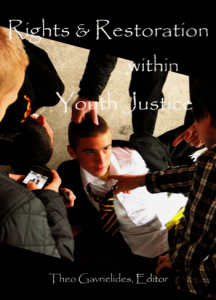News & Announcements
- Details
- Written by Joshua Wachtel
 The Kentucky Center for Restorative Justice and the Children’s Law Center present Restorative Practices: A Statewide Symposium at Spalding University on Thursday, October 10th, 2013, from 9 am to 5 pm. The theme of the symposium is "Teaching Leaders to Implement Restorative Practices for Youth."
The Kentucky Center for Restorative Justice and the Children’s Law Center present Restorative Practices: A Statewide Symposium at Spalding University on Thursday, October 10th, 2013, from 9 am to 5 pm. The theme of the symposium is "Teaching Leaders to Implement Restorative Practices for Youth."
IIRP President Ted Wachtel will present a keynote address on themes from his new book, Dreaming of a New Reality: How restorative practices reduce crime and violence, improve relationships and strengthen civil society. Sujatha Baliga, director of the Restorative Justice Project for the National Council for Crime & Delinquency will also be featured.
For more information call 502-873-4314 or register online.
- Details
- Written by Joshua Wachtel
- Details
- Written by Joshua Wachtel
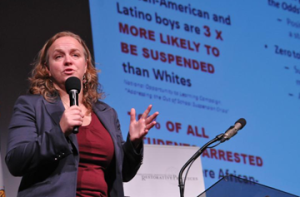 Cami Anderson, State District Superintendent, Newark Public SchoolsIn a press release titled "Zero Tolerance for Zero Tolerance Policies," Newark Public Schools (NPS) and Newark Police Department (NPD) announce the launch of a "Historic Initiative with the International Institute for Restorative Practices to End the School to Prison Pipeline."
Cami Anderson, State District Superintendent, Newark Public SchoolsIn a press release titled "Zero Tolerance for Zero Tolerance Policies," Newark Public Schools (NPS) and Newark Police Department (NPD) announce the launch of a "Historic Initiative with the International Institute for Restorative Practices to End the School to Prison Pipeline."
The article says:
Staff members from NPS joined forces with NPD to shift school discipline policies from zero tolerance to youth development. The training was facilitated by the world renowned International Institute for Restorative Practices (IIRP). The initiative was spearheaded by NPD Police Director Samuel A. DeMaio and NPS Superintendent Cami Anderson.
- Details
- Written by Joshua Wachtel
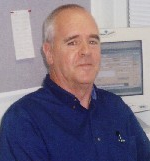 Ivan Webb, a retired principal and teacher from Tasmania, Australia, tweets about restorative practices (@IvanWebb). He collects his weekly updates in a weekly online newspaper format, called Restorative Schools (embedded below). In last week's edition, he posted a short sidebar editorial in which he argues that while restorative practices are effective for responding to serious incidents, people should not stop there but consider the reasons for adopting a more proactive approach, "to be restorative for all students all the time."
Ivan Webb, a retired principal and teacher from Tasmania, Australia, tweets about restorative practices (@IvanWebb). He collects his weekly updates in a weekly online newspaper format, called Restorative Schools (embedded below). In last week's edition, he posted a short sidebar editorial in which he argues that while restorative practices are effective for responding to serious incidents, people should not stop there but consider the reasons for adopting a more proactive approach, "to be restorative for all students all the time."
- Details
- Written by Joshua Wachtel
 Here's a radio program about a therapeutic boarding school located in northern Idaho for at-risk teens where restorative justice circles are becoming more and more embedded for responding to problems and helping teens work through conflict. The host is Lon Woodbury and the interview is with Lisa Hester, director of student life at Boulder Creek Academy in northern Idaho.
Here's a radio program about a therapeutic boarding school located in northern Idaho for at-risk teens where restorative justice circles are becoming more and more embedded for responding to problems and helping teens work through conflict. The host is Lon Woodbury and the interview is with Lisa Hester, director of student life at Boulder Creek Academy in northern Idaho.
The player will popup in a new window at LA Talk Radio.
- Details
- Written by Joshua Wachtel
Update: Seminary students are eligible for a $550 discount on this event. To register call 1-610-807-9221.
 Deborah van Deusen Hunsinger, Professor at Princeton Theological Seminary, attended the FaithCARE event in Ontario, Canada[/caption]"If restorative practices were more widely known, and its structures and processes more widely put into place, churches would be far better equipped to deal with conflict, harm, or trauma in a healthy manner." -Deborah van Deusen Hunsinger, Professor of Pastoral Theology, Princeton Theological Seminary, Princeton, New Jersey
Deborah van Deusen Hunsinger, Professor at Princeton Theological Seminary, attended the FaithCARE event in Ontario, Canada[/caption]"If restorative practices were more widely known, and its structures and processes more widely put into place, churches would be far better equipped to deal with conflict, harm, or trauma in a healthy manner." -Deborah van Deusen Hunsinger, Professor of Pastoral Theology, Princeton Theological Seminary, Princeton, New Jersey
To this end, the IIRP is offering a 4-day retreat at Kirkridge Retreat Center in eastern Pennsylvania, September 23-26, 2013, titled "Strengthening Faith Communities Through Restorative Practices." The event will be co-facilitated by Bruce Schenk, director of IIRP Canada, and Anne Martin, director of FaithCARE Services, Shalem Mental Health Network, Ontario, Canada.
- Details
- Written by Joshua Wachtel
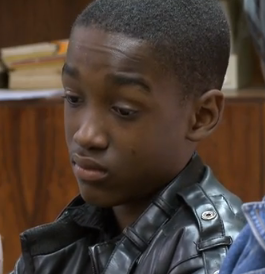 This month the Public Broadcast System in the United States is showing a documentary film titled Fixing Juvie Justice. The film provides a critique of the revolving door of youth justice, and its criminalizing effect on many youth who originally commit very minor crimes. Then it turns to an examination of restorative justice as an alternative model, and discusses some of the roots of conferencing in New Zealand.
This month the Public Broadcast System in the United States is showing a documentary film titled Fixing Juvie Justice. The film provides a critique of the revolving door of youth justice, and its criminalizing effect on many youth who originally commit very minor crimes. Then it turns to an examination of restorative justice as an alternative model, and discusses some of the roots of conferencing in New Zealand.
Dr. Lauren Abramson, founder and executive director of the Community Conferencing Center in Baltimore, Maryland, USA, and Assistant Professor of Child Psychiatry at Johns Hopkins School of Medicine, is quoted throughout the video. She was a student of Sylvan Tomkins, whose theory of affect has been very useful for helping to explain what happens in a restorative conference. Abramson also describes her personal quest to find a better way to work with criminal offenders, especially young ones.
- Details
- Written by Joshua Wachtel
I was struck by the sincerity of this post by an anonymous offender who opts for a restorative justice meeting with the person he victimized:
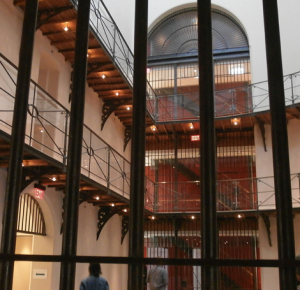 Photo of Don Jail, Toronto by Mark Watmough at Flickr Creative Commons.
Photo of Don Jail, Toronto by Mark Watmough at Flickr Creative Commons.
I wanted to tell people what restorative justice means to me, as someone who has been through the whole process.
In prison, I made so many steps to change and I thought that there was something not there, something that was missing. That’s when I heard about restorative justice. I thought about how my victim felt and so I got involved with it. I wasn’t expecting to get as much out of it as I got out of it.
When I got out of jail and met my victim, it was a really big shock. I would never put anybody through that again. I can say that because I have been through restorative justice and I know how it affects them. I can recommend it [restorative justice] to anybody who is thinking of changing.
- Details
- Written by Joshua Wachtel
There are so many lovely short videos now that demonstrate restorative approaches in schools. This one features the voices of many students as well as staff and administrators at two schools in Greater London.
- Details
- Written by Joshua Wachtel
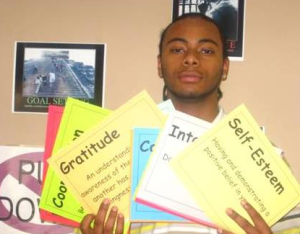 A youth recognized for displaying all 15 character traits as part of the Evidenced Based Aggression Replacement Training Program (photo from the Tennessee Department of Children Services Web Site)Aggression Replacement Training® is a new IIRP event which explores how to reduce violence and youth aggression for those working in education, criminal justice, social services and youth counseling. The Aggression Replacement Training process involves engaging and empowering aggressive youth to take responsibility for their behavior and learn healthier ways of interacting with others.
A youth recognized for displaying all 15 character traits as part of the Evidenced Based Aggression Replacement Training Program (photo from the Tennessee Department of Children Services Web Site)Aggression Replacement Training® is a new IIRP event which explores how to reduce violence and youth aggression for those working in education, criminal justice, social services and youth counseling. The Aggression Replacement Training process involves engaging and empowering aggressive youth to take responsibility for their behavior and learn healthier ways of interacting with others.
Dr. Craig Adamson, Assistant Professor at the IIRP Graduate School and Executive Director of Community Service Foundation/Buxmont Academy, IIRP's demonstration projects for at-risk youth, said that Aggression Replacement Training is an evidence-based restorative practice that has demonstrated success over the past two years with youth in the CSF Buxmont programs. "What I like about Aggression Replacement Training," said Craig, "is that it's very restorative. It's engaging and empowering. Aggression Replacement Training talks about how youth relate to all the stakeholders in their lives and how to engage appropriately with one another. It also looks at what happens with shame, how you can identify your own feelings in the moment, and it is very explicit with kids."

Restorative Works Year in Review 2024 (PDF)
All our donors are acknowledged annually in Restorative Works.

